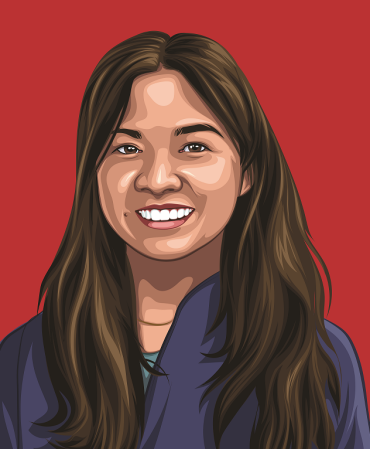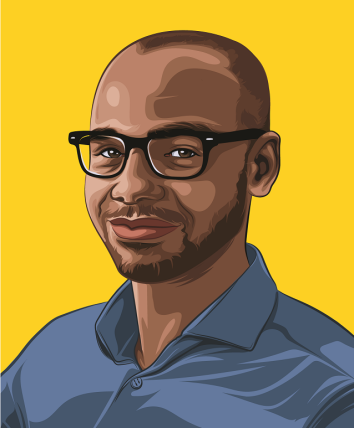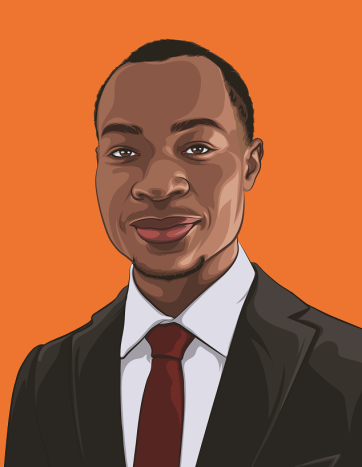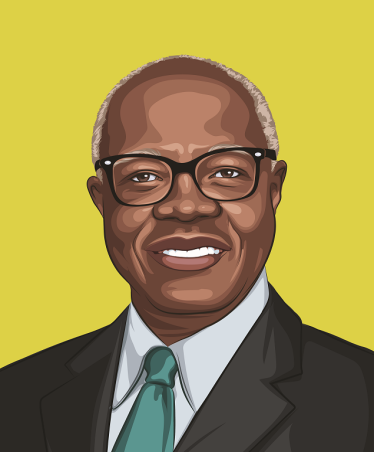
By Molly Schulson
Illustrations by Aaron Sacco
For three Weill Cornell Medicine summer training programs—all dedicated to helping socioeconomically disadvantaged or minority undergraduates explore careers in the medical sciences—this is a milestone year. Two of them, Advancing Cornell Career Experiences for Science Students (ACCESS) and Gateways to the Laboratory, mark 25 years of service, while the Travelers Summer Research Fellowship celebrates 50. All three provide research experience, mentorship and insight into the admissions process for medical or graduate school, as well as stipends and on-campus housing. Each receives hundreds of applications for a handful of spots.
Travelers—named for Travelers Insurance, which endowed the program in 1995—was founded in 1969; the first class consisted of 10 undergrads at what’s now Hampton University, a historically black college in Virginia. Since then, 1,217 pre-med students from around the country have participated. They work in labs, attend a lecture series on cardiovascular physiology and learn what a career in medicine is really like. “Travelers was developed to increase the number of minority physicians, as they were woefully underrepresented,” says Dr. Elizabeth Wilson-Anstey, assistant dean of diversity and student life, who has worked with the program since 1976 and is now its director. “The program gives students confidence and helps them see the practice of medicine up close, reaffirming their desire to become a physician.” From 1969 to 2015 (the most recent year for which statistics are available), 82.7 percent of Travelers alumni went on to gain admission to medical school.
ACCESS was created in 1993 for students interested in biology and medical research. Initially a collaboration between Howard University and Weill Cornell Graduate School of Medical Sciences, the program (now open to undergrads from any institution) has welcomed 216 students from colleges nationwide. ACCESS participants match with a faculty mentor, conduct basic research and attend workshops to help prepare for graduate school. “The experience really motivates people,” says Dr. Marcus Lambert, assistant dean of diversity and student life and director of the program, “and it allows us to contribute to the diversity of people pursuing biomedical research nationwide.”
When Gateways began with four participants in 1993, it was the nation’s first summer program for aspiring MD-PhDs. It was reimagined in 1998; changes included having current MD-PhD students serve as peer mentors and flying in parents to attend the final oral and poster presentations in August. “Many participants are first-generation college students, so it’s not just about the students learning what a physician-scientist is—it’s important to educate their parents as well,” says Dr. Ruth Gotian, the assistant dean for mentoring who was Gateways’ director from 1997 to 2018. “The parents attending the presentations realize that a roomful of people is listening to their son or daughter, and it’s special.” Gateways now has 309 alumni; as of a 2013 analysis published in Academic Medicine, every participant who went on to apply to MD-PhD programs successfully gained admission.
At the end of each summer, ACCESS and Gateways students present their research at the Leadership Alliance National Symposium, an annual conference for young scholars (held most recently in Hartford, Conn.). Program alumni are encouraged to stay connected with one another and their mentors as their educational careers proceed. “We were all trying to improve ourselves, and these summer programs made our goals feel more attainable,” says Dr. Raja Flores, who participated in Travelers as an NYU undergrad in 1987 and is now chief of thoracic surgery at Mount Sinai. “More than anything, we were given real hope and guidance.”
ACCESS (Advancing Cornell Career Experiences for Science Students)
Farah Lubin, PhD (1995)
Associate Professor
University of Alabama at Birmingham

Dr. Lubin first heard about ACCESS—then known as the Marcus M. Reidenberg Gateways to Science Program—when she was a pre-med student at Alabama State University. At the time, she was debating whether to earn an MD-PhD, which could have taken up to 12 years to complete. So when Dr. Lubin learned about ACCESS, she thought it might help her make up her mind— and the Weill Cornell Medicine campus was close to her parents, who lived on Long Island.
Prior to arriving at Weill Cornell Medicine, Dr. Lubin didn’t have much lab experience, but she soon found herself spending hours at the bench. In the lab of Dr. Elizabeth Lacy, a professor of cell and developmental biology who studies the human embryo, she was introduced to basic techniques like pipetting and learned how to present a research poster. “The feeling of knowing you can actually perform these tasks was incredible,” Dr. Lubin says. “At first, doing research seems daunting—you think maybe it’s not for you— but being given the opportunity to work in the lab environment made everything more tangible and less intimidating.” By summer’s end, Dr. Lubin knew she wanted to earn a doctorate and focus on research. “The lab environment was very exciting for me,” she says. “It really solidified what I wanted to do.” After graduating college, she went on to earn a PhD in biochemistry and cell and molecular biology from Binghamton University.
Dr. Lubin is now an associate professor of neurobiology at the University of Alabama at Birmingham, where she runs the Roadmap Scholars Program; funded by the National Institute of Neurological Disorders and Stroke, it aims to engage and retain minority grad students who are interested in neuroscience. ACCESS inspired her to start the program, which she says gives participants a vital support system, including assisting with career planning. Says Dr. Lubin: “Students need an opportunity like this, where someone says, ‘You can do it.’”
Chloe Lopez-Lee (2015 & 2016)
PhD Candidate
Weill Cornell Graduate School of Medical Sciences

Prior to 2015, ACCESS was limited to rising juniors and seniors. But that didn’t stop Lopez-Lee, then a rising sophomore, from applying anyway. She became the youngest participant in ACCESS history—and her success led to an expansion in program eligibility. Lopez-Lee worked in the lab of Dr. Teresa Milner, professor of neuroscience, which aims to understand the influence of estrogen on the brain. “I learned so much,” says Lopez-Lee. “And it was great having a woman scientist as a mentor.” She also grew fond of Journal Club, a component of ACCESS that exposes participants to academic papers; realizing she wasn’t the only one struggling to decipher the materials made her feel less alone. At the end of most days, she commuted to her parents’ home on the Lower East Side with a MetroCard furnished by the Weill Cornell Graduate School of Medical Sciences. “The fact that they provided me with that in addition to my stipend—that meant a lot to me,” she says.
Lopez-Lee enjoyed the experience so much that she returned for a second summer in Dr. Milner’s lab, and the following summer she studied fatty liver disease at The University of California, San Francisco. Now, she’s a first-year PhD candidate in neuroscience at Weill Cornell Graduate School of Medical Sciences. “I remember talking to the graduate students while I was just an undergrad and thinking, Wow, they’re in the real world,” she says. “I looked up to them—so to be in their position now is surreal.”
Gateways to the Laboratory
Emma Schatoff (2011)
Sixth-Year Student
Tri-Institutional MD-PhD Program

Schatoff was a high school student interning in a neurobiology lab at The Rockefeller University when she learned that it was possible to conduct research for a living. Before that, she thought if you liked science, all you could do was go to medical school—but she never pictured herself as a physician, so research seemed like the perfect way for her to pursue science as a career. What’s more, she says, the Rockefeller lab was led by a female scientist, Dr. Leslie Vosshall— which made it easier for her to envision doing the same thing one day. When she found out about the Gateways program, it seemed like an invaluable opportunity. “Everyone in Gateways had limited research experience,” she says. “But we learned that if we worked hard enough, we could accomplish our goals.”
Interested in cancer biology, Schatoff worked in the lab of Dr. Ross Levine, a physician-scientist at Memorial Sloan Kettering Cancer Center, which studies blood cancers known as myeloid malignancies. “I had an incredible experience,” she says. “I remember working with some patient samples, and I thought how meaningful it would be to treat these patients and meet them in person. That was the moment I decided I should apply to the dual degree program.”
Schatoff returned to the Levine lab the following summer, and—thanks in part to the experience she gained from Gateways—was accepted into the Tri-Institutional MD-PhD Program in 2013. Having completed her first two years of medical school, Schatoff is currently doing her doctoral work in biological sciences under Dr. Lukas Dow, assistant professor of biochemistry in medicine. Working at the Sandra and Edward Meyer Cancer Center, she’s using mouse models to identify targeted therapies in colon cancer. As a woman of Cuban and Russian descent, Schatoff believes it’s important to bring minority students into science training programs. “Physicians and researchers work with diverse populations,” she notes. “We need trainees and professionals that can effectively represent and relate to the communities they’re serving.”
Jonathan Abraham, MD, PhD (2002)
Assistant Professor
Harvard Medical School

During the Gateways awards ceremony this past August, Dr. Abraham—an alum of the program who received his MD-PhD from Harvard Medical School and now runs a research lab in the school’s Department of Microbiology and Immunobiology—had the honor of giving the keynote address marking Gateways’ 25th anniversary to an audience of current participants. “I couldn’t believe it was 16 years ago that I was in their shoes,” he says. “It was nice to serve as the ocular proof that this can be done.” Dr. Abraham, who is Afro-Caribbean, is thankful for the supportive environment that Gateways created for people like him. “When you want to pursue a career in medicine and you are from an underrepresented background, you look around and notice not a lot of people look like you,” he says. “Seeing people like you doing what you want to be doing serves as inspiration and motivation.”
Originally from Haiti, Dr. Abraham’s family moved from Canada to Queens, New York, where he attended high school. He became fascinated with viruses after reading “The Coming Plague,” a book that warned about emerging diseases. Dr. Abraham matriculated at Harvard knowing he wanted to be a doctor, but Gateways was his first opportunity to focus on research—specifically, on a bacteria that causes chronic lung infections in patients with cystic fibrosis. “This is where I learned that a PhD was something I’d be excited about,” says Dr. Abraham. “There was suddenly a fire in my belly to pursue both career paths.” Over the past decade, he has focused on how emerging viruses, like Ebola and Zika, interact with the cells they infect and how the human immune response can be harnessed to fight them. “When I was a participant in Gateways, there weren’t many people like me giving a lecture,” he says. “It’s nice to be able to serve that role now.”
Travelers Summer Research Fellowship
Ikenna Onyekwere (2018)
Senior Biology Major
Cornell University

“My father always jokes that every time he got paid, I would get sick,” says Onyekwere, who was born in Nigeria and suffered from a variety of illnesses as a child. “So he spent all of his money taking me to the hospital.” When Onyekwere was 4, he and his family moved to Irvington, N.J. Growing up there, he remembers sitting in the waiting rooms of doctors’ offices and watching people leave because they didn’t have access to health insurance due to their socioeconomic or immigration status. “They had illnesses that could have been fixed if they could just see a doctor,” Onyekwere recalls. Seeing this firsthand—as well as having been a patient himself—inspired him to dream of a career in medicine.
Onyekwere attended community college before transferring to Cornell’s Ithaca campus as a junior. As a rising senior on a pre-med track, he attended a summer program at Rutgers New Jersey Medical School, where he met Dr. Elizabeth Wilson-Anstey, who directs Travelers and encouraged him to apply. Onyekwere made the most of the program by asking visiting lecturers if he could shadow them for a day; one of them (Dr. Anthony Watkins, assistant professor of surgery and attending surgeon at New York-Presbyterian/Weill Cornell Medical Center) even gave him the chance to observe a kidney transplant surgery. He worked long hours in the lab of Dr. Mandë Holford, adjunct assistant professor of biochemistry; he synthesized a venomous peptide, derived from a predatory marine snail, that has potential therapeutic applications. His efforts paid off when he received high praise for his final research presentation. “Travelers was amazing,” says Onyekwere, now in the process of applying to medical school. “It was probably the best summer I’ve ever had.”
Ivor Benjamin, MD (1977)
President, American Heart Association;
Director, Cardiovascular Center, Medical College of Wisconsin

Though Dr. Benjamin commuted to campus when he was a Travelers student, he recalls that he enjoyed hanging out in Olin Hall, the Weill Cornell Medicine dorm in which out-of-town participants are housed. “Travelers allowed me to form lifelong friendships,” says Dr. Benjamin, whose fellow students included Dr. Gary Gibbons, now director of the NIH’s National Heart, Lung and Blood Institute. “All of a sudden you’ve got this infusion and concentration of really talented people who are funny and smart, and you realize you have so much in common.”
Born in Guyana—a tiny nation in South America that didn’t even have a medical school when he was growing up—Dr. Benjamin excelled in school; he was just 9 when he first thought about becoming a doctor, after his grandmother suffered a stroke. After high school, Dr. Benjamin moved to Brooklyn with his family and enrolled in Hunter College, where he heard about Travelers from upper classmen who had participated. At Weill Cornell Medicine, he worked in a lab run by Dr. Daniel Wellner, now a professor emeritus of biochemistry. That, along with the program’s lecture series on cardiovascular physiology, inspired him to continue doing cardiology research while earning his MD at Johns Hopkins. Since 2013, Dr. Benjamin has directed the cardiovascular center at the Medical College of Wisconsin. A co-founder of the Journal of the American Heart Association (AHA), he became president of the AHA (a part-time, volunteer position) this year.
In addition to the many benefits of Travelers, Dr. Benjamin says, the program gives students a “huge psychological boost”—which is why he encouraged his daughter, Charis Benjamin, to participate in 2015. She applied without mentioning who her father was, because she wanted to be accepted on her own merit. When she was admitted, “that was a proud moment for me,” Dr. Benjamin says, adding that he later received an invitation from Dr. Wilson-Anstey to give a guest lecture. Meeting the bright students in his daughter’s cohort made him hopeful for the future. “It’s good to see young people still bitten by the bug who wish to pursue and excel in science,” he says. “Expanding the biomedical research pipeline is mission critical— and programs like Travelers are an important way to make sure we do that.”
This story first appeared in Weill Cornell Medicine, Fall 2018
